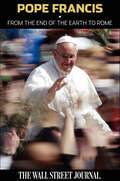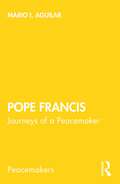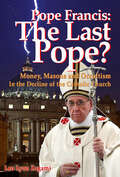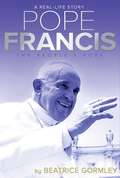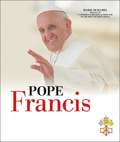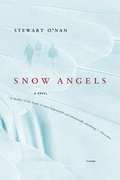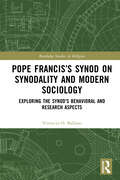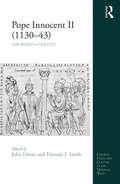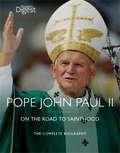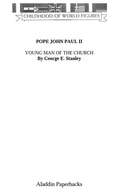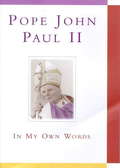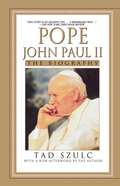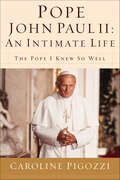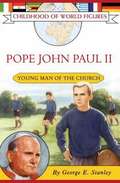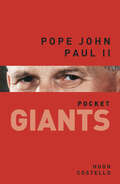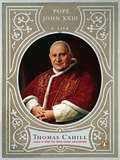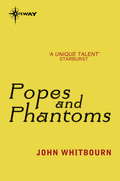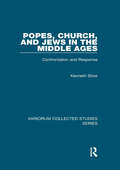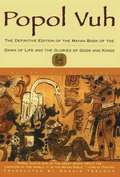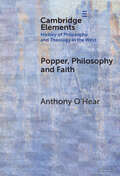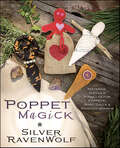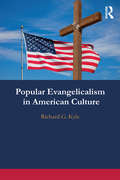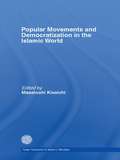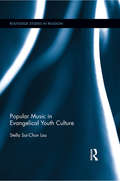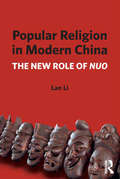- Table View
- List View
Pope Francis: From the End of the Earth to Rome
by The Staff of the Wall Street JournalOn March 13, the cardinals of the Catholic Church, gathered to elect a successor to a living Pope for the first time in 600 years, announced a dramatic shift. By elevating Cardinal Jorge Mario Bergoglio of Argentina to become Pope Francis the 266th Pontiff, the cardinals were naming the first-ever Pope from the growing New World to take the helm of the church at a crucial moment.It was a stunning move by a 2,000-year-old institution that has immense influence—with 1.2 billion adherents worldwide—and huge problems, including a decade-old sex-abuse scandal that has shattered faith in the institution, a shortage of priests and secular trends that have drained the church of members and challenged its relevancy in a changing world.From the shocking decision by Pope Benedict XVI to retire, to the introduction of Pope Francis, from the back streets of Buenos Aires to the front row at St. Peter's Square, reporters from The Wall Street Journal have chronicled these dramatic weeks in the life of the oldest institution in the world. Now, in a new e-book, Journal reporters will present a detailed, timely and original biography of the new Pope Francis, as well as new insight on the bargaining and drama that surrounded his rise. Pope Francis will present the full, in-depth story of the church's change in direction and the man charged with leading it, and consider how Pope Francis might address the years of scandal and shortcomings while leading Catholics worldwide toward a deeper faith.
Pope Francis: Journeys of a Peacemaker (Peacemakers)
by Mario I. AguilarThis volume is about Pope Francis, the diplomat. In his eight years of pontificate, Pope Francis as a peacemaker has propagated the ideas of human and divine cooperation to build a global human fraternity through his journeys outside the Vatican. This book discusses his endeavours to connect and develop a common peaceful international order between countries, faith communities, and even antagonistic communities through a peaceful journey of human beings. The book analyses his speeches, and meetings as a diplomat of peace, including his visits to Cuba and the United States, and his mediations for peace in Colombia, Myanmar, Kenya, Egypt, Turkey, Jordan, Jerusalem, the Central African Republic, Sri Lanka, and Bangladesh. It discusses the role of Pope Francis as mediator in different circumstances through his own writings, letters, and Vatican documents; his encounters with world leaders; as well as his contributions to a universal understanding on inter-faith dialogue, climate change and the environment, and human migration and the refugee crisis. The volume also sheds light on his ideas on a post-pandemic just social order, as summarised in his 2020 encyclical. A definitive work on the diplomacy and the travels of Pope Francis, this volume will be of great interest to scholars and researchers of religious studies, peace and conflict studies, ethics and philosophy, and political science and international relations. It will be of great interest to the general reader as well.
Pope Francis: Money, Masons and Occultism in the Decline of the Catholic Church
by Brad Olsen Leo ZagamiPope Francis: The Last Pope? reveals the possible reasons for the choice of historical abdication of Benedict XVI and traces the process that led to the election of Cardinal Bergoglio: the Pope who many have prophesized will be the last and will bring the Catholic Church to its end. The book details the history of this prophecy, which was hidden away in the Vatican for hundreds of years and predicts that the reign of the last Pope will herald the beginning of "great apostasy" followed by "great tribulation." It also explores the recent scandals in the Catholic Church and addresses questions including What pressures decreed the end of the pontificate of Benedict XVI? What powers have an interest for the Church to end? and What is the relationship between the Vatican and the New World Order? Perfect for anyone interested in prophecies about the end times, Pope Francis: The Last Pope reveals the truth about what numerology says about the last Pope and the darkness that may follow him, as well as fascinating investigations into the gay lobby, Freemasonry, and the Jesuit agenda in the Vatican and how it relates to the first Borgia Pope, the legend of the White Pope and the Black Pope, and how Benedict's resignation may fulfill an ancient prophecy.
Pope Francis: The People's Pope (A Real-Life Story)
by Beatrice GormleyBea Gormley tells the story of Pope Francis, known as the People&’s Pope, who has humbly said, &“My people are poor and I am one of them.&”Ordained as Pope on March 13, 2013, Pope Francis became the 266th Pope of the Roman Catholic Church. Known worldwide for his great humility and approachability, he is the first citizen from the Americas, the first non-European, and first Jesuit priest to be named Pope. Gormley explores the pontif&’s early years, growing up as the eldest of five children of Italian immigrants in Argentina, working as a chemical technician before venturing in the priesthood as a Jesuit novice. He went from Bishop to Archbishop to Cardinal—and gained a reputation for personal humility, doctrinal conservatism, and a commitment to social justice, which stands to this day. Named Person of the Year by Time magazine in December 2013, Pope Francis remains outspoken in support of the world&’s poor and marginalized people, and he has been involved actively in areas of political diplomacy and environmental advocacy.
Pope Francis: The Story of the Holy Father
by Marie DuhamelFrom the moment he was elected into the papacy, Pope Francis has captured the attention of the world with his humility, charisma, and reformist spirit.This one-of-a-kind, illustrated biography of the first Jesuit pope offers more than 250 photographs and 50 removable documents from Francis's life. Written by Vatican Radio reporter Marie Duhamel, this intimate portrait includes his parents emigration from Italy, his birth as Jorge Mario Bergoglio in 1936, his love of soccer and opera as a child, the pneumonia that nearly cost him his life as a young adult, his calling to the priesthood, and his first encounter with poverty as a missionary in Chile that would change his life. Duhamel chronicles Francis's rise from priest to bishop to cardinal to the papacy and how, along the way, he impressed many people-and alienated some-with his courage to stand up to authority and his dedication to helping the poor.Enclosed documents such as his baptism certificate, photographs from his childhood, pages from a school notebook, handwritten notes as pope, and even a support card for his beloved San Lorenzosoccer club, further illuminate his life and create a lasting keepsake of this pope of the people.
Pope Francis: Untying the Knots
by Paul VallelyFrom his first appearance on a Vatican balcony Pope Francis proved himself a Pope of Surprises. With a series of potent gestures, history's first Jesuit pope declared a mission to restore authenticity and integrity to a Catholic Church bedevilled by sex abuse and secrecy, intrigue and in-fighting, ambition and arrogance. He declared it should be "a poor Church, for the poor." But there is a hidden past to this modest man with the winning smile. Jorge Mario Bergoglio was previously a bitterly divisive figure. His decade as leader of Argentina's Jesuits left the religious order deeply split. And his behaviour during Argentina's Dirty War, when military death squads snatched innocent people from the streets, raised serious questions – on which this book casts new light. Yet something dramatic then happened to Jorge Mario Bergoglio. He underwent an extraordinary transformation. After a time of exile he re-emerged having turned from a conservative authoritarian into a humble friend of the poor – and became Bishop of the Slums, making enemies among Argentina's political classes in the process. For Pope Francis – Untying the Knots, Paul Vallely travelled to Argentina and Rome to meet Bergoglio's intimates over the last four decades. His book charts a remarkable journey. It reveals what changed the man who was to become Pope Francis—from a reactionary into the revolutionary who is unnerving Rome's clerical careerists with the extent of his behind-the-scenes changes. In this perceptive portrait Paul Vallely offers both new evidence and penetrating insights into the kind of pope Francis could become.
Pope Francis’s Synod on Synodality and Modern Sociology: Exploring Behavioral and Research Aspects (Routledge Studies in Religion)
by Vivencio BallanoThis book focuses on the value and necessity of modern sociology to Pope Francis’s church reform project known as the Synod on Synodality. It explores the behavioral and research aspects of this latest synod, applying sociological perspectives and methods and drawing on secondary literature, media reports, and church documents. The author argues that sociology is crucial for translating the major theological concepts into behavioral and research indicators to empirically ground the overall theological framework of the synod as an ecclesial innovation rather than a revolution in the Catholic Church. The importance of sociological research methodology is emphasized to guide the synod’s complex and multi-stage qualitative data collection, which seeks to understand the synodal concerns of all Catholics in today’s world. The book addresses the need for scientific approaches to church reforms and for a nuanced complementarity between sociology and theology. It will be of particular interest to scholars of theology, religion, and sociology, as well as those actively involved in the workings of the Catholic Church.
Pope Innocent II: The World vs the City (Church, Faith and Culture in the Medieval West)
by John Doran Damian J. SmithThe pontificate of Innocent II (1130-1143) has long been recognized as a watershed in the history of the papacy, marking the transition from the age of reform to the so-called papal monarchy, when an earlier generation of idealistic reformers gave way to hard-headed pragmatists intent on securing worldly power for the Church. Whilst such a conception may be a cliché its effect has been to concentrate scholarship more on the schism of 1130 and its effects than on Innocent II himself. This volume puts Innocent at the centre, bringing together the authorities in the field to give an overarching view of his pontificate, which was very important in terms of the internationalization of the papacy, the internal development of the Roman Curia, the integrity of the papal state and the governance of the local church, as well as vital to the development of the Kingdom of Sicily and the Empire.
Pope John Paul II
by Editors of Reader's DigestFrom his survival of Nazi-occupied Poland to his joining the priesthood and ascension to the papacy, this account of Pope John Paul II offers unique insight to the man who would be pope with personal stories from not only those who new him from the church, but classmates and friends as well. Discover the athletic, the political, and most recently, the beatified, Pope John Paul II. In this ebook you will discover: Personal stories written by friends and classmates, teachers, and fellow clergy An account of his death and details of his funeral as the world mourned, including Cardinal Ratzinger's emotional homily. Details on the miracle - chosen out of hundreds attributed to him - that sent on him on the road to sainthood A full update of his life that includes his May 2011 beatification and the rigorous process of sainthood. Discover an athletic Karol Wotjyla, who hiked, biked, skied, and kayaked in his long life His efforts for Poland's freedom involving Solidarity, the Vatican, the Polish government, the White House, and the Kremlin
Pope John Paul II
by George E. StanleyPope John Paul II was born Karol Wojtyla on May 18, 1920, in Poland. As a child Karol excelled in school -- especially in religion and literature. He was a star soccer player and also hiked and kayaked. But most of all Karol loved poetry and theater. Although Karol was liked and respected by his peers, his childhood was touched by tragedy. His mother passed away when he was only nine years old, and three years later his beloved older brother, Edmund, died from scarlet fever. Karol grew up in a time of great uncertainty for Poland. Although he was born into an independent Poland, he was a young man during the Nazi occupation of his homeland in World War II. When many Poles were anti-semitic, Karol had Jewish friends; when his country turned its back on religion, Karol studied in secret to become a priest. This fascinating biography details Karol's childhood and the events that led him to be named Pope John Paul II in 1978.
Pope John Paul II: In My Own Words
by Anthony F. Chiffolo Anthony ChiffoloProviding inspiration from the man whose advice and insights have touched the hearts of millions, this collection of quotations, poems, and prayers reveals Pope John Paul II in his many roles: as teacher, pastor, poet, leader, lover of all humanity, and follower of Christ. In this book, the pope addresses everything from the search for truth to the wonder of love, from the holiness of the family to the responsibilities of the priesthood, and from the miracle of life to the mystery of the Incarnation. His words reveal the compassion, joy, and wisdom born of his more than fifty years as a servant of God. Compiled from his pastoral letters, encyclicals, daily audiences, books, poems, favorite prayers, and homilies--including his addresses from his recent history-making visit to Cuba--the passages in this collection reveal Pope John Paul II's undying faith and concern for the human spirit. They demonstrate why his message of faith transcends religious and political divides, and illustrate why he is one of history's most beloved religious leaders.
Pope John Paul II: The Biography
by Tad SzulcPope John Paul II is one of the pivotal figures of this century, the spiritual head of more than one billion believers and a world statesman of immense stature and influence. Yet, at the age of seventy-six and in the eighteenth year of his papacy, he remains a mystery -- theologically, politically, and personally. Now, through unprecedented access to both the Pope himself and those close to him, veteran New York Times correspondent and award-winning author Tad Szulc delivers the definitive biography of John Paul II. This strikingly intimate portrait highlights the Polishness that shapes the Pope's mysticism and pragmatism, while providing a behind-the-scenes look at the significant events of his public and private life, including:The inside story of the negotiations involving John Paul II, Soviet President Gorbachev, and General Jaruzelski of Poland that led to Poland's and Eastern Europe's transition from communism to democracyJohn Paul II's secret diplomacy, which resulted in the establishment of relations between the Holy See and IsraelThe never-before-told story of how the Polish communist regime helped to "make" Karol Wojtyla an archbishop, the key step on his road to the papacy.Fascinating and thought-provoking, this biography of Pope John Paul II is vital reading not only for Roman Catholics, but for anyone interested in one of the most important figures of our time.
Pope John Paul II: The Pope I Knew So Well
by Caroline PigozziThis behind-the-scenes perspective offers a unique opportunity to experience Pope John Paul II's character and reign, as well as a look at the inner workings of the Vatican. French journalist Caroline Pigozzi discovered a man both awe-inspiring and surprisingly warm and generous. Passionately prayerful and unimpressed by pomp and celebrity, John Paul II was the most-traveled and perhaps the most popular of the popes to date: a people's pope. Pigozzi reveals the intimate details of his daily life, his sometimes surprising philosophies, his revolutionary desire for accessibility to ordinary people, and his relentless drive to unify the church. This book unveils, in a friendly and richly informative way, a close-up of the man whose "eyes radiated infinite goodness" and whose life touched so many.
Pope John Paul II: Young Man of the Church
by George E. StanleyPope John Paul II was born Karol Wojtyla on May 18, 1920, in Poland. As a child Karol excelled in school -- especially in religion and literature. He was a star soccer player and also hiked and kayaked. But most of all Karol loved poetry and theater. Although Karol was liked and respected by his peers, his childhood was touched by tragedy. His mother passed away when he was only nine years old, and three years later his beloved older brother, Edmund, died from scarlet fever. Karol grew up in a time of great uncertainty for Poland. Although he was born into an independent Poland, he was a young man during the Nazi occupation of his homeland in World War II. When many Poles were anti-Semitic, Karol had Jewish friends; when his country turned its back on religion, Karol studied in secret to become a priest. This fascinating biography details Karol's childhood and the events that led him to be named Pope John Paul II in 1978.
Pope John Paul II: pocket GIANTS
by Hugh CostelloThe world was stunned when little-known Karol Wojtyla became the first non-Italian pope for 450 years. As Pope John Paul II, he continued to surprise, directly confronting Communist regimes, flying hundreds of thousands of miles to meet the faithful, and building bridges with other faiths. John Paul II became a bête noire in the eyes of liberals for his staunch refusal to accept contraception or the ordination of women. But for others he was a Churchillian figure who took on the forces of godlessness and moral relativism. He gained a stature that left secular statesmen in his shadow. Love him or loathe him, few could deny that he was a man of rare courage. He survived two assassination attempts, fought off cancer and waged a very public battle with Parkinson’s disease. Seven years after his death he continues to exert a hold over the Church and to inspire an almost cult-like devotion.
Pope John XXIII
by Thomas CahillAngelo Guiseppe Roncalli was an unexpected choice to follow the ultra conservative Pope Pius XII in 1958. At seventy-six years old, 'a fat old man with twinkling eyes and a seductively resonant voice', neither a well-known public figure nor a highly trained theologian, he was at first regarded as a transitional pope. During his brief but unforgettable reign as Pope John XXIII, however, he astonished the world with the seminal and unprecedented change he brought about in the Catholic Church. He was a deeply political man and played an important part on the world stage, helping to defuse the Cuban missile crisis of 1963. He also rewrote litury to avoid any crude condemnation of the Jews, tens of thousands of whom he had saved from the Holocaust when he was an apostolic administrator in Turkey.
Popes and Phantoms
by John WhitbournAdmiral Slovo was a man of his time, but of more than one dimension..In his sixteenth century, a pirate might be followed by the corpse of his victim, walking across the ocean, until putrescence claimed it. Or an interview with the Pope might be mirrored, exactly, by one with the Devil. Reality shifts could cause a King to see his capital city shimmer into another Realm entirely.Through such scenes of macabre hallucination, mayhem and murder, Slovo is a man alone, set apart by his stoic beliefs from the rigours of human fears and passions. As such, he was a valuable find for the Vehme, a clandestine, subversive society that ensnared its members from an early age, securing loyalties by the expedient methods of blackmail, bribery and barbarism.But Slovo is more than a Vehmist puppet, and whether as a brigand on the high seas, or emissary to the Borgias, or as the Pope's Machiavellian Mr Fix-it, he plots a course that suits his own ends as much as those of his paymasters. He knows that, in the words of his mentor Marcus Aurelius, "in a brief while you will be ashes of bare bones; a name, or perhaps not even a name". And there are few things that cannot be solved by a stiletto in the eye.
Popes, Church, and Jews in the Middle Ages: Confrontation and Response (Variorum Collected Studies #876)
by Kenneth StowThe theme uniting the essays reprinted here is the attitude of the medieval Church, and in particular the papacy, toward the Jewish population of Western Europe. Papal consistency, sometimes sorely tried, in observing the canons and the principles announced by St Paul - that Jews were to be a permanent, if disturbing, part of Christian life - helped balance the anxiety felt by members of the Church. Clerics especially feared what they called Jewish pollution. These themes are the focus of the studies in the first part of this volume. Those in the second part explore aspects of Jewish society and family life, as both were shaped by medieval realities.
Popol Vuh: The Definitive Edition of the Mayan Book of the Dawn of Life
by Dennis TedlockPopol Vuh, the Quiché Mayan book of creation, is not only the most important text in the native languages of the Americas, it is also an extraordinary document of the human imagination. It begins with the deeds of Mayan gods in the darkness of a primeval sea and ends with the radiant splendor of the Mayan lords who founded the Quiché kingdom in the Guatemalan highlands. Originally written in Mayan hieroglyphs, it was transcribed into the Roman alphabet in the sixteenth century. This new edition of Dennis Tedlock's unabridged, widely praised translation includes new notes and commentary, newly translated passages, newly deciphered hieroglyphs, and over forty new illustrations.
Popper, Philosophy and Faith (Elements In the History of Philosophy and Theology in the West)
by Anthony O'HearThis Element aims to make good an imbalance in scholarly work on the thought of Karl Popper. Towards the end of his life he developed a dualistic view of the self, and connected to it, a model of reality consisting of three worlds: first the inorganic world; a second level domain of consciousness; and a third world of ideas, institutions and concepts. This third world develops beyond the ideas and understanding of its human inventors. The implications of these later developments has not been fully considered, nor has his idea that his critical rationalism rests on an irrational faith. These are considered against the context of his more famous work on science and the open society. Popper saw his late work in quasi-Platonic terms, and the similarities and differences here are explored. Does Popper's work as a whole tend in an unfulfiled Platonic direction or need a religious foundation?
Poppet Magick: Patterns, Spells & Formulas for Poppets, Spirit Dolls & Magickal Animals
by Silver RavenWolfMake Your Own Magickal Spirit Dolls and Totem AnimalsIncludes color photos and illustrations to guide you step-by-step!From bestselling author Silver RavenWolf comes a hands-on book for exploring a fascinating realm of magick. Poppet Magick shares everything you need to make your own enchanted dolls and spirit animals for love, money, health, banishing, attracting what you want, and much more. Discover more than 36 patterns for paper, cloth, or felt poppets, as well as instructions for working with a variety of other mediums. This book also includes guidance on choosing colors, herbs, oils, gemstones, and other ingredients that correspond to your magickal intentions as well as helpful hints on timing, sigils, incantations, and ceremonies for empowering and decommissioning your dolls. Whether you make your own poppets or work with store-bought dolls, this book will help you achieve magickal success.
Popular Evangelicalism in American Culture
by Richard G. KylePopular Evangelicalism in American Culture explores the controversies, complexities, and historical development of the evangelical movement in America and its impact on American culture. Evangelicalism is one of the most dynamic and growing religious movements in America and has been both a major force in shaping American society and likewise a group which has resisted aspects of the modern world. Organised thematically this book demonstrates the impact of American culture on popular evangelicalism by exploring the following topics: politics; economics; salvation; millennialism; the megachurch and electronic churches; and popular culture. This accessible and thought-provoking volume will interest anyone concerned with the modern-day success of the Evangelical movement in America.
Popular Movements and Democratization in the Islamic World (New Horizons in Islamic Studies)
by Masatoshi KisaichiEver since the terrorist incident of September 11th a general understanding seems to have arisen among people that the challenges posed by Islam have now acquired human and global dimensions. Popular Movements and Democratization in the Islamic World contains case studies of people’s movements in diverse areas and periods, and it seeks to develop a comparative view of Islam and democracy that goes beyond the usual stereotype of Islam being incompatible with democracy. Unravelling the complexities that have arisen between Islam and democracy is the principal task of Islamic scholars, and this book will undoubtedly prove a starting point for all such endeavours. While primarily intended for students and scholars, this timely and important text will prove of interest even to general readers with interests in Islamic studies.
Popular Music in Evangelical Youth Culture (Routledge Studies in Religion #20)
by Stella Sai-Chun LauChristian churches and groups within Anglo-American contexts have increasingly used popular music as a way to connect with young people. This book investigates the relationships between evangelical Christianity and popular music, focusing particularly on electronic dance music in the last twenty years. Author Stella Lau illustrates how electronic dance music is legitimized in evangelical activities by Christians’ discourses, and how the discourses challenge the divide between the ‘secular’ and the ‘sacred’ in the Western culture. Unlike other existing books on the relationships between music cultures and religion, which predominantly discuss the cultural implications of such phenomenon, Popular Music in Evangelical Youth Culture examines the notion of ‘spirituality’ in contemporary popular electronic dance music. Lau’s emphasis on the sonic qualities of electronic dance music opens the door for future research about the relationships between aural properties of electronic dance music and religious discourses. With three case studies conducted in the cultural hubs of electronic dance music – Bristol, Ibiza and New York – the monograph can also be used as a guidebook for ethnographic research in popular music.
Popular Religion in Modern China: The New Role of Nuo
by Lan LiSince the early 1980s, China's rapid economic growth and social transformation have greatly altered the role of popular religion in the country. This book makes a new contribution to the research on the phenomenon by examining the role which popular religion has played in modern Chinese politics. Popular Religion in Modern China uses Nuo as an example of how a popular religion has been directly incorporated into the Chinese Community Party's (CCP) policies and how the religion functions as a tool to maintain socio-political stability, safeguard national unification and raise the country's cultural 'soft power' in the eyes of the world. It provides rich new material on the interplay between contemporary Chinese politics, popular religion and economic development in a rapidly changing society.
